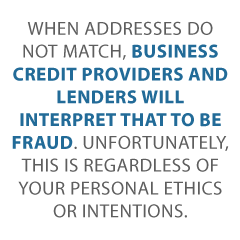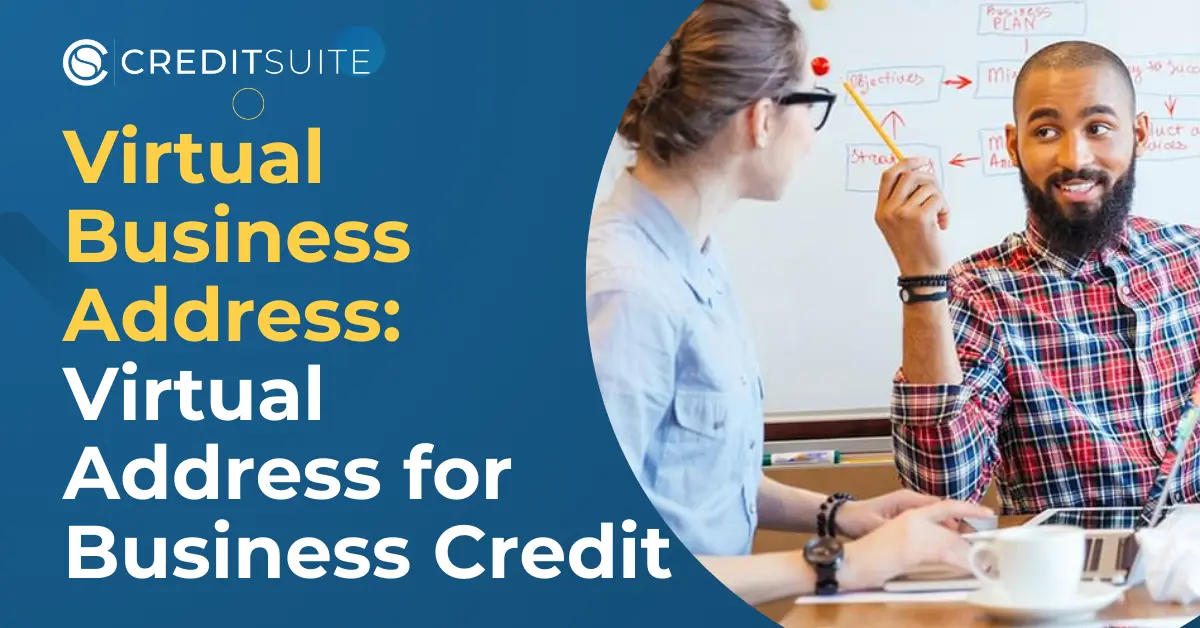What is a Virtual Business Address, and Can it Help with Fundability?
A virtual business address is when you pay for a separate address for your company. But, for the most part, you don’t do business there.
This page contains affiliate links to products. We may receive a commission for purchases made through these links.
Business Credit
Business credit is credit in the name of a business. Correctly built, it doesn’t have anything to do with its owner’s personal credit. With business credit, a business owner can get:
- Vendor credit cards
- High-limit accounts with most major retailers
- Fleet credit
- Cash credit including Visa and MasterCard
You can get approval for business credit accounts regardless of personal credit quality. When you build business credit the right way, there is no personal credit pull. Building business credit depends on payment history more than anything else.
Fundability™
Fundability is the ability of a business to be funded. This means, in essence, a business’s chances of getting money. This is money from lenders and credit providers. Building Fundability goes hand in hand – and starts – the process of business credit building.
Some Fundability elements are impossible to control, like your time in business. But others can be controlled by the ownership. This includes your business address.
Building Strong Fundability
There are a few things you can do to help lenders see your business as one that is Fundable. It all starts with how you set up your business. It has to be set up in a very specific way to build Fundability. Each step is vital, and if you miss one, it could do more harm that you may think.
Setting Up Your Business to Be Fundable to a Lender
The goal is to make your business a separate, stand alone, fundable entity apart from the owner, and to remove any doubts that it might not be. First, your business has to have separate contact information. This includes a business phone number, address, and email address.
Incorporating
Your business won’t be a separate legal entity from you unless you incorporate. Corporations need to have addresses, and it’s best for your corporation’s address to be in the same state where it’s incorporated. This is better for Fundability.
Your Business Address
Your business address is one of the first elements of Fundability you should be setting up. Why? Because a lot of the subsequent paperwork you’ll need to fill out will call for your business address. This paperwork is everything from your EIN application to applying for business licenses. You want all of your business’s paperwork to be right.
So if you don’t have a separate address from the very start – and you want one – you’re only going to have to change it later. And that means everywhere!
Getting a Separate Business Address
Just like a business phone number, your address will go on marketing materials, loan applications, and more. A residential address for a retail establishment can potentially get it flagged as un-established. The same is true if you use a UPS box or PO box. You need a brick and mortar address.
It has to be a place where mail can be delivered. Lenders, credit providers and more will check out your business on Google Street View. If they spot it’s a residential address, then if yours is a retail business, you could be inviting denials. And there’s no good reason to do so!
Using a Virtual Business Address as a Separate Business Address
A virtual office is a great solution. It’s far less expensive than renting office space. Here are three virtual office providers we love:
What is a Virtual Business Office?
According to Wikipedia:
“A virtual office is part of the flexible workspace industry that provides businesses with any combination of services, space and/or technology, without those businesses bearing the capital expenses of owning or leasing a traditional office.”
You can often get a great city address. There can be workspaces if you need to use them. And you might get access to conference rooms. Some plans include receptionists. A small business does not have to look small.
Get a Virtual Business Address with Regus
Regus offers:
-
- Meeting rooms
- Drop-in business lounges where you can work if you have a long layover during travel
- A membership plan
- Mail forwarding and handling
Options from Regus include furnished offices with high-speed internet. These can be co-working spaces or window offices or interior. Call for pricing on office suites. Co-working spaces cost the least.
They have a presence around the world. Their more popular non-US locations are in several European countries. Costs vary.
Get a Virtual Business Address from Alliance Virtual Offices
Alliance Virtual Offices offers:
-
- A live receptionist
- Meeting rooms
- An office address
-
- Optional mail forwarding
- Local or toll-free business number
- Unlimited local and long distancing calling
- Voicemail by email, custom greetings, an online control panel, etc.
They have a presence around the world. Their more popular non-US locations are in Mexico, the UAE, the UK, and the Netherlands.
Consider a Virtual Business Address through Davinci
Davinci offers:
-
- Live receptionists for hire
- Live web chat services
- Meeting rooms
- Event spaces
- An office address
They have a presence around the world. Their more popular non-US locations are in Mexico, countries in Europe, South Korea, Hong Kong, Japan, and Brazil. Costs for Davinci addresses will vary.
What if Your Area Doesn’t Have Alliance Virtual Offices, Regus, or Davinci Where You Can Get a Virtual Business Address?
 You may need to improvise. Consider talking with local business owners. Find out what they do. Perhaps there are shared spaces. Or your fellow local business owners may even be interested in going in with you on a shared space. Will never, ever hurt to ask.
You may need to improvise. Consider talking with local business owners. Find out what they do. Perhaps there are shared spaces. Or your fellow local business owners may even be interested in going in with you on a shared space. Will never, ever hurt to ask.
It might be fruitful to talk to local computer user groups too. Or you can consider going out of state if you are near a border. For example, Alexandria, Virginia and Baltimore, Maryland are less than 50 miles from each other. So in some cases you may have more options, just by looking past the border.
Fundability Also Means Consistency in Business Information and Fraud Concerns
When addresses do not match, business credit providers and lenders will interpret that as fraud. Unfortunately, this is regardless of your personal ethics or intentions.
Think about phone numbers, addresses, and even your business email address. Has your business address changed, or have you opened a new location?
Make certain any new addresses are listed on all documents. This includes:
-
- Insurance papers
- Business licenses
- Fictitious business name documents (if your business is a DBA)
- Incorporation papers
- Everything!
This is the case whether your business address is virtual or not.
Your Virtual Business Address: Takeaways
A separate business address is ultimately more professional. It’s also more fundable, giving lenders and credit providers a more positive feeling that your business will be able to pay its debts. In turn, that means it’s more likely that you’ll get loans and credit.

